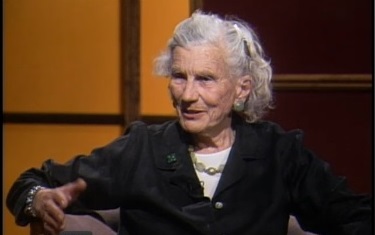Helping dyslexic students
2 Replies
I've just discovered a great little nine minute video of US learning disabilities pioneer Diana Hanbury King talking online, about whose book I blogged yesterday (but sorry, I had the price wrong at first yesterday, I paid US$28 plus P&P, not AUD$28).
King talks about the critical importance of preventing early literacy failure, quoting the poet Matthew Arnold: "hope once crushed is less quick to rise anew".
She says children's early difficulties are often not recognised by schools, so they receive inappropriate teaching, fail to learn and end up with damaged self-esteem.
While studying to become a teacher she met another special education pioneer, Anna Gillingham, who test kindergarteners, found the ones who were at risk for literacy difficulties, provided them with careful, multisensory, sequential instruction, and at the end of fourth grade "they were on a par with the students who'd been in the regular program, except that they were better at spelling".
She says, "And I always thought this is what every school in the country would do, and you and I would not be in the business of rescuing students who had to fail early in their lives". Why this is taking so long I don't understand, either.
While King values technology, she says the initial teaching must be done by people not machines. "Students learn one on one, person to person".
She says that Singapore's public schools now have specialist classrooms and teachers, "and are really beginning to prevent the early failure which…we would like to see prevented everywhere".
While there are programs preventing early literacy failure in many US schools, King expresses frustration that, "We have yet to impact teacher training. Teacher training does not include the ways of doing multisensory training, of knowing the sounds of the language, of working with handwriting. None of that is part of teacher training, in almost all colleges, I can think of maybe a couple". She's talking about the US, but the same can be said of Australian Education faculties.
King says dyslexics of any age can be helped, but the older you get the harder it is, so "we would like to see early intervention everywhere". She urges her interviewer, who runs a specialist learning difficulties school, to run parent training and summer schools to "get this kid ready for success in first grade. A new challenge for you".
A challenge for many of us, I think.
Here's the link to the video again, in case you couldn't see the version embedded in this post.



[…] US Pioneer of special education for dyslexic students Diana Hanbury King talks in a 9-minute video about helping, and ultimately preventing, literacy failure. […]
Dr. Diana Hanbury King was a true pioneer in the field of early intervention for dyslexia. Students need to be identified as soon as possible to avoid developing poor coping habits, like avoidance to manage their struggles. One-one-one, explicit, multi-sensory instruction should be the front line of treatment for dyslexic students.
I wrote this blog about her typing program that I have used with dozens of students struggling with dysgraphia.
https://www.developingkidsminds.com/post/2017/02/04/theendofhuntingandpecking